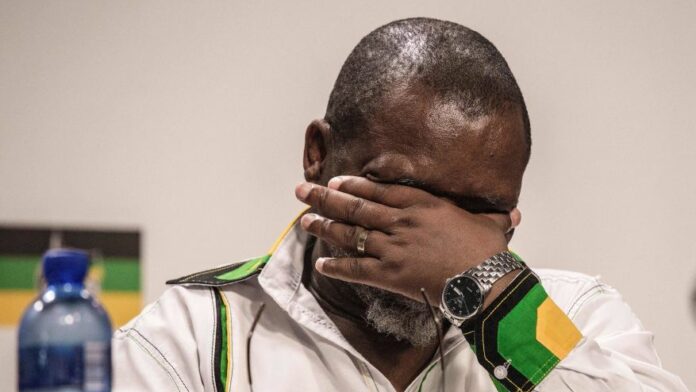
THE South African mining industry is nowhere near getting a new cadastral system, the Department of Mineral Resources and Energy (DMRE) said on the first day of the Mining Indaba 2022.
During a question-and-answer session following his keynote address on Monday, Gwede Mantashe, South African Mines Minister acknowledged there was no timeframe for implementing a new mining cadastre to replace the dysfunctional SAMRAD system. “You can’t commit to a deadline for something that hasn’t started.”
Mining companies have been calling for a new modern and transparent online cadastre that will stem corruption with the award of licences and bring about much-needed investment in exploration in the industry.
Responding to a question from the floor, Patricia Gamede, acting director-general, told journalists that there has been no progress from the side of the State IT Agency (SITA) with issuing tenders for service providers tasked with developing a cadastral system. SITA provides IT service support to government departments.
Mantashe was asked to provide an update on progress with the logjam in issuing exploration and mining licences. Roger Baxter, CEO of the SA Minerals Council told journalists earlier that the backlog is around 4,500 outstanding applications.
He said it’s complicated to clear the licence application backlog if the department does not know to whom licences had been issued in the past. “Until we resolve the issue of our cadastral system the clearing of the backlog is going to be slow.”
He was however upbeat about the recent publication of the DMRE’s long-awaited exploration strategy, which was gazetted in April. According to Mantashe, the DMRE worked closely with the mining industry in developing the strategy, but sources close to the process say otherwise.
The Minerals Council said in a statement issued on 13 April that the body had concerns with the quality of the drafting of the strategy, while there were “numerous changes” to the draft plan that had been agreed upon in January 2021.
Don’t blame us for missing coal export bonanza
Asked about the sorry state of Transnet’s rail system, which has held back exports and led to an opportunity cost of some R30bn for the industry, Mantashe advised journalists to speak to Transnet’s CEO Portia Derby. “She is around. Talk to her. It will serve you much better.”
The DMRE, said Mantashe, are also clients of Transnet, just like the mining industry. He acknowledged though that the dysfunctional state-owned entity has serious implications for specifically the coal industry. “We would have loved to export as much coal as we can to Europe; they’re ordering huge amounts. We would have liked to harvest this opportunity.”
During his keynote address in the morning, Mantashe failed to mention the most glaring challenges the mining industry faces, such as the absence of a mining cadastre, logistical issues and the serious delays in the granting of mining and exploration licences.
He did however, stress that Africa needs to beneficiate its minerals rather than merely exporting the raw material. He blamed colonial powers for building roads that only led to harbours. “The impact of the exploitation (of Africa’s mineral endowment) was such that roads were built from mine to ports.”
Mantashe called on investors attending this year’s Mining Indaba to discuss among themselves how they can help Africa to beneficiate its natural resources. “If it’s mining from pit to port, someone else extracts the value.”
Peter Leon, partner and Africa chair of international law firm Herbert Smith Freehills, said in a statement that Mantashe’s speech should have mentioned South Africa’s progress to fixing the country’s dysfunctional mining licence system or how long-standing issues around the Mining Charter would be resolved.
“Nobody is disputing the fact that South Africa’s mining sector is endowed with enormous potential and opportunity. The problem is that we are not working to extract this.”











